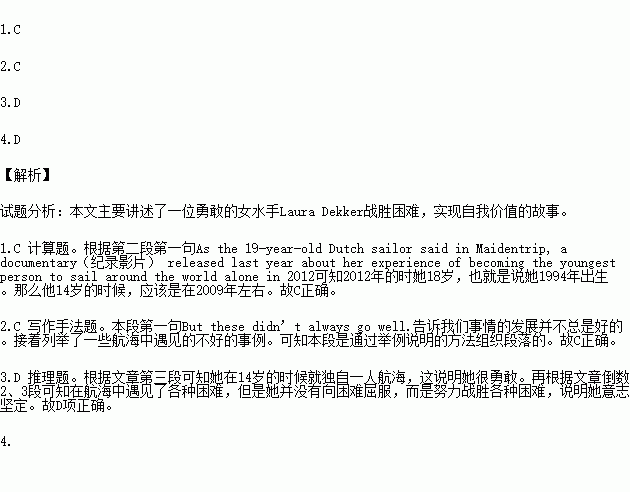题目内容
Wild weather, unexpected coral reefs and dangerous sea creatures… these are the nightmares (噩梦) you can imagine a teenager on a solo voyage (独自旅行) around the world might suffer from. But for Laura Dekker, sailing around the globe seems less a price to be paid than a prize to be treasured.
As the 19-year-old Dutch sailor said in Maidentrip, a documentary(纪录影片) released last year about her experience of becoming the youngest person to sail around the world alone in 2012, “I was born on a boat. I lived my first five years at sea. And ever since, all I have wanted is to return to that life.”
With her yacht(游艇) Guppy, Dekker began her journey at 14 and sailed 50,004 kilometers in 519 days.
The flying fish keeping her company, the dolphins following in her wake and the warm days spent on deck playing the flute (长笛) as she watched another unforgettable sunset were enough to make others jealous.
But these didn’t always go well. There were terrible moments in which Dekker feared death. On one occasion, a whale almost turned Guppy over. Another time, she battled extreme winds and Guppy surfed down 8-meter-high waves.
Out on the open sea alone, she also got used to living without a fridge, a flushing(用水冲洗) toilet, and a hot shower.
“As a human being you don’t need much,” she told Stuff.co.nz. “ They might make life more comfortable, but you really don’t need them to be happy.”
In fact, her outlook on life was shaped by the trip. “I wanted the storms. I wanted the calms. I wanted to feel loneliness,” she told The New York Times. “And now I know all these things. It’s the end of the dream I had as a child, and it’s the beginning of my life as a sailor.”
1.According to the text, in which year did Dekker begin her journey of 50,004 kilometers at sea?
A. In 2012 B. In 2010 C. In 2009 D. In 2011
2. The method the author uses to develop Paragraph 5 is ________.
A. offering analyses B. providing explanations
C. giving examples D. making comparisons
3.Which of the following can best describe the girl Laura Dekker? _________.
A. Modest and optimistic
B. Patient and hospitable
C. Brave and generous
D. Brave and determined
4. How did Laura Dekker think of her life on the sea?
A. It was so dangerous and almost ruined her.
B. It brought her great happiness and much comfort.
C. It is the sailing on the sea that made her well known.
D. Full of danger and challenge, it made her experience happiness and better understand life as well.
书面表达
近段时间你发现校园内浪费现象严重,请你在班会上发表演讲,谈谈你所看到的浪费现象及危害,并就这一现象发表个人见解。
浪费现象 | 1. 不关水、不关教室的电灯 2. 食堂里的桌子上丢满食物 3. 校园里乱丢纸张、书本 |
造成危害 | 1. 浪费资源 2. 形成坏习惯,不利于品德养成 3. 浪费金钱,增加父母经济负担 |
个人认识 | 适当发挥 |
注意:1. 词数100左右;
2. 演讲的开头和结尾已写好,不计入总词数。
参考词汇:食堂canteen 给某人增加经济负担 add financial burden to sb
Dear friends,
May I have your attention, please? Now I’d like to make a speech here.
_____________________________________________________________________
_____________________________________________________________________
_____________________________________________________________________
That’s all. Thank you!

